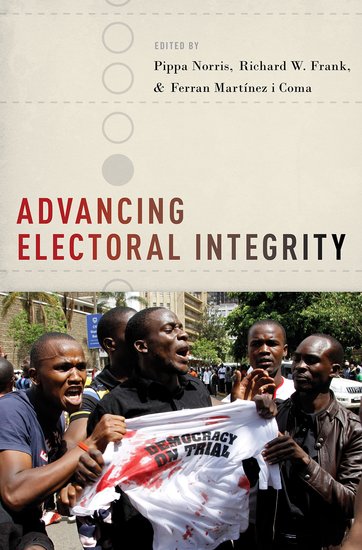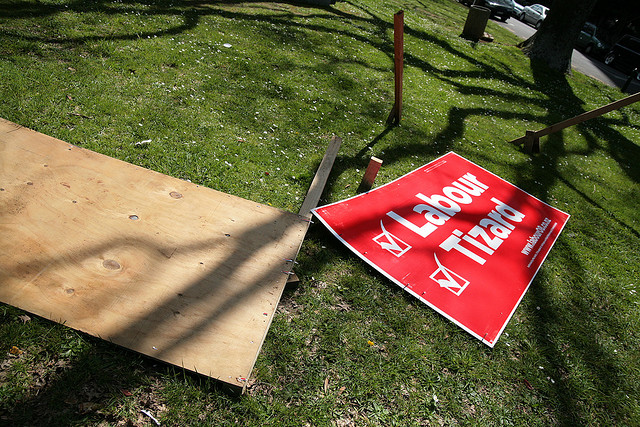Book Review: Advancing Electoral Integrity edited by Pippa Norris, Richard W Frank and Ferran Martínez i Coma

Advancing Electoral Integrity. Pippa Norris, Richard W Frank and Ferran Martínez i Coma (eds). Oxford University Press. 2014.
Most UK citizens assume – without giving the issue much thought in most cases – that our elections are in general very ‘free and fair’. There are occasional ‘scandals’, but these are treated as aberrations and do not undermine general confidence in our system and procedures – perhaps because the depth of current problems is relatively hidden. Media reports of elections elsewhere – mainly in countries with only relatively short experience of democracy – suggest that free and fair elections are far from universally the case, however, as illustrated by the number of NGOs and other bodies that undertake monitoring missions.
Relatively little academic attention has been paid to electoral integrity – as the study of electoral malpractice and its consequences has been named. The ACE Electoral Knowledge Network defines contests with integrity as those based on universal suffrage and political equality, conducted to international standards, and which are ‘professional, impartial and transparent in [their] preparation and administration throughout the electoral cycle’, and without which electoral outcomes lack legitimacy and confidence in the democratic process is low. This lacuna in assessing how many contests meet those criteria is now being filled, in substantial part through a major international Electoral Integrity Project led by Pippa Norris and others.
Advancing Electoral Integrity comprises chapters based on papers presented at one of its workshops. Pippa Norris’s introductory discussion on ‘Challenges of electoral integrity’ sets out the agenda, buttressed by useful comparative data on electoral fraud as reported in major world media – Africa has generated most of those stories, followed in second place for much of the last two decades by North America! The challenges lie in the creation and then implementation of standards for elections for whose outcomes legitimacy can be claimed: what should comprise those standards and what empirical evidence can be collected to assess claims that particular elections have been free and fair? Much of this necessarily focuses on countries’ Election Management Bodies (EMBs), which vary substantially in their status, roles, and effectiveness, hence their central presence throughout the book. And what happens when elections are perceived as unfree and unfair – by either or both of external monitoring bodies (which themselves vary in their impartiality and professionalism) and the local population?
These issues are tackled in the book’s three main sections – on ‘When do elections fail? Standards and evidence’; ‘Do institutions matter? Managing elections’; and ‘Does lack of integrity undermine legitimacy?’. The three substantive chapters in the first illustrate the difficulties in monitoring elections, especially over the full electoral cycle rather than just in the campaign’s final weeks and the conduct of the poll. Given those difficulties, how can expert judgments be made regarding legitimacy and is it possible to quantify them so as to produce comparative databases – a contribution by two of the book’s editors illustrates their suggested way forward.
If elections vary in their legitimacy, and this can be quantified, is it then possible to evaluate the relative success of different types of EMB? Three chapters in the second section attempt such quantitative assessments, using a range of databases including some specifically designed to measure integrity and its various components. Their conclusions are both provisional and to some extent inconsistent, but they strongly suggest that elections with considerable political involvement (including deciding which outside bodies to invite as ‘impartial’ monitors) are less likely to be deemed ‘legitimate’ – although it is unclear what type of EMB regime (whether it is constitutionally defined, for example) could best avoid that problem.
The fourth chapter in that section takes a different approach. Toby James explores the standard of electoral management in the UK through interviews with those involved in its implementation – local government officers. He identifies ten major challenges these officials face, as a consequence, for example, of increased voter apathy, decreased voter trust, increasingly complex legal requirements, and reduced financial resources. The focus is not on fraud – though that may be a consequence of the situation – but rather of difficulties in managing elections, so that the ‘scandals’ that emerge in particular contests at particular places result in feedback loops that aggravate popular mistrust.
This conclusion is sustained by a second chapter on the UK – the first in the book’s final section – on ‘Investing in electoral management’. Using data on the amount spent in each local authority on the 2009 European Parliament elections and the Election Commission’s ratings of their performance, Alistair Clark shows that more spending results in better elections.
The remaining chapters in that final section essay similar tasks for Africa, Latin America and the United States, again using quantitative indices to identify how both external observers and the local population assess an election’s legitimacy. These modelling exercises (which treat all of a continent’s countries as homogeneous blocks) suggest that there is greater trust where there are respected EMBs, along with a range of other interesting, some unsurprising, findings – supporters of winning parties tend to have greater faith in an election’s integrity, for example, than do those who support a losing party/candidate! Similar findings emerge from a study of electoral fraud in the USA; black voters are more likely to think elections fraudulent than members of other ethnic groups, as are Republicans compared to Democrats, for example – as also, in the 2012 presidential contest, were Romney compared to Obama supporters.
The book lacks a conclusion, just the text of a panel discussion held at the end of the workshop under the title ‘Lessons from the ground: what have we learned? what do we do next?’. As such the volume is but part of a whole, reflecting growing academic interest in the subject. Another set of papers is being published in a forthcoming issue of Electoral Studies, and Pippa Norris has provided an overview in her recently-publishedWhy Electoral Integrity Matters. Clearly the six-year project will deliver more material and both broaden and deepen our appreciation of the nature, extent and impact of electoral fraud and malpractice plus the institutions created and measures adopted to prevent it.
Free and fair elections matter to democracy. But this form of governance faces many other contemporary challenges as an increasing number of commentators and theorists question its sustainability within global capitalism. In some countries electoral malfeasance very substantially undermines governments’ legitimacy and accountability, and the case for change is strong. Elsewhere – including in the UK – perhaps election management is robust enough that worrying too much about its minutiae is a modern equivalent of fiddling while Rome burns? But if we are losing confidence in our elections and their outcomes, and so also in the governments they deliver, where else can we look to ensure individual life, liberty and the pursuit of happiness: perhaps the minutiae do matter?
—
Note: this post originally appeared on the LSE Review of Books. It represents the views of the authors and not those of Democratic Audit or the LSE. Please read our comments policy before posting.
—
 Ron Johnston is a professor in the School of Geographical Sciences at the University of Bristol; his most recent contributions to electoral studies include (with Charles Pattie) Money and Electoral Politics (The Policy Press, Bristol, 2014) and (with David Rossiter and Charles Pattie) Equality, Community and Continuity: Reviewing the UK Rules for Constituency Distributions. Read more reviews by Ron.
Ron Johnston is a professor in the School of Geographical Sciences at the University of Bristol; his most recent contributions to electoral studies include (with Charles Pattie) Money and Electoral Politics (The Policy Press, Bristol, 2014) and (with David Rossiter and Charles Pattie) Equality, Community and Continuity: Reviewing the UK Rules for Constituency Distributions. Read more reviews by Ron.






 Democratic Audit's core funding is provided by the Joseph Rowntree Charitable Trust. Additional funding is provided by the London School of Economics.
Democratic Audit's core funding is provided by the Joseph Rowntree Charitable Trust. Additional funding is provided by the London School of Economics.
Ron Johnston reviews @ElectIntegrity’s Advancing Electoral Integrity, https://t.co/pmgUOlhZ3x <- my chapter on UK Electoral Management inside
Book Review: Advancing Electoral Integrity edited by Pippa Norris, Richard W Frank and Ferran Martínez i Coma https://t.co/iIcC3V8zgI
Book Review: Advancing Electoral Integrity edited by Pippa Norris, Richard W Frank and Ferran Martínez i Coma https://t.co/A5dItL0OrE